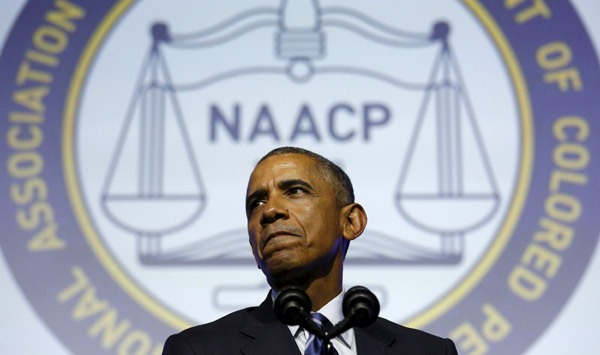Obama calls for shorter sentences for nonviolent convicts
(Agencies) Updated: 2015-07-15 10:01
 |
|
US President Barack Obama pauses while speaking at the NAACP's annual convention in Philadelphia July 14, 2015.[Photo/Agencies] |
WASHINGTON - US President Barack Obama on Tuesday laid out an expansive vision for fixing the US criminal justice system by focusing on communities, courtrooms and cellblocks. He announced a federal review of the use of solitary confinement and urged Congress to pass a sentencing reform bill by year's end.
In a speech to the annual convention of the NAACP civil rights group, Obama also called for voting rights to be restored to felons who have served their sentences, and said employers should stop the practice of asking job candidates about their past convictions. He said long mandatory minimum sentences now in place should be reduced or discarded entirely.
"In far too many cases, the punishment simply doesn't fit the crime," Obama told a crowd of 3,300 in Philadelphia. Low-level drug dealers, for example, owe a debt to society, but not a life sentence or a 20-year prison term, he said.
With his speech to the prominent African-American advocacy group, Obama sought to put a spotlight on the need for new legislation as he mounted a weeklong push on criminal justice reform. A day earlier, Obama commuted the sentences of 46 nonviolent drug offenders - the most commutations a president has issued on a single day in at least four decades.
Upon arriving Tuesday in Philadelphia, Obama met with a number of former prisoners to discuss their experience re-entering society, the White House said. And on Thursday, Obama planned to put a personal face on the nation's mushrooming prison population with a visit to El Reno Federal Correctional Institution outside of Oklahoma City - the first visit to a federal prison by a sitting US president.
The assertive moves reflected a president eager to wield his executive power during his waning years in office to reduce harsh sentences, cut costs and correct disparities he said have disproportionally burdened minorities. Earlier in his presidency, as he spent his political capital carefully on major domestic priorities, Obama spoke cautiously and only intermittently about the need for smarter sentencing and other justice changes.
But as of late, public attention has been piqued by a serious of upsetting incidents across the country. In places like Baltimore, New York and Ferguson, Missouri, tensions between law enforcement and their communities have spilled out into the open, underscoring longstanding concerns among minority communities that they're treated differently in the criminal justice system.
- Obama meets with Vietnamese leader to expand ties
- No plan to send more US troops abroad to fight IS: Obama
- Obama hails 'new, more ambitious chapter' in US-Brazil relations
- Obama signs trade bills into law, giving boost to TPP talks
- Obama, Putin discuss situations in Mideast, Ukraine over phone
- Obama in race against time to end talks with China and save legacy






